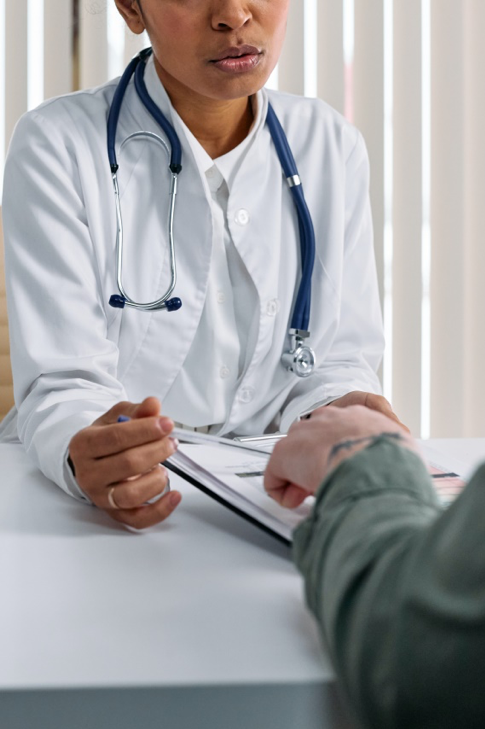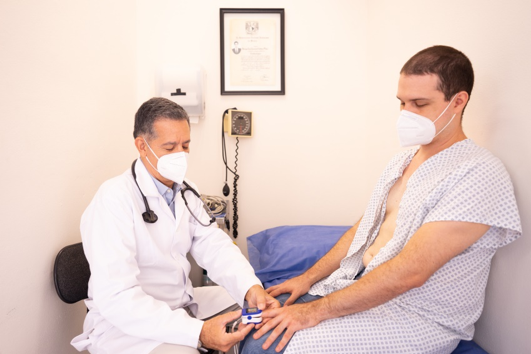The male reproductive system has a small sized muscular gland known as the prostate. This gland essentially surrounds the urethra, making the most of the fluid present in the semen. Our prostates propel the semen and fluid through the penis when we have a sexual climax. Unfortunately, many men get an enlarged prostate. Sometimes, this results in certain symptoms and complications. Fortunately, however, certain treatments can help.

(Source)
Symptoms and Causes of Enlarged Prostate
Also referred to as benign prostatic hyperplasia, an enlarged prostate often occurs whenever the prostate gland’s cells multiply. It may cause swelling in the prostate gland, squeezing the urethra, which limits urine flow. Contrary to popular belief, enlarged prostate or benign prostate hyperplasia is not a form of prostate cancer. That said, it can result in painful symptoms, which may impact your quality of life. This issue is especially common among in aged fifty or more.
Causes of Enlarged Prostate
Men often get an enlarged prostate as they grow older. While the exact reason this happens is still a mystery, certain changes in sex hormones could be one of the reasons. A family history of testicular abnormalities or prostate problems could greatly increase your chances of getting benign prostatic hyperplasia.
What are the Symptoms
Enlarged prostate symptoms tend to be quite mild initially. However, they start getting serious if you do not seek treatment. Some of the most common symptoms of an enlarged prostate include the following:
- Finding blood in your urine
- Feeling pain while urinating
- A delayed or slow urinary stream
- A weakened urinary system
- Having difficulty emptying your bladder
- The need to go to empty your bladder multiple times at night
- Dribbling once your urinary stream ends
- Finding blood in your urine
How Do Doctors Diagnose an Enlarged Prostate?
When doctors check their patients for benign prostatic hyperplasia, they usually start by performing a physical examination. A detailed rectal examination is a prominent part of this test as it helps doctors determine your prostate’s shape and size. Here are some other tests doctors perform to diagnose an enlarged prostate:
Cystoscopy: A cystoscopy is a test to examine your bladder or urethra with the help of a small scope instead of in the urethra.
Post void residual: A post void residual helps doctors determine how much urine is in your bladder.
Prostate specific antigen test: Examiners perform this blood test to check prostate cancer symptoms.
Urodynamic test: In a urodynamic test, the doctor will fill your bladder with a liquid through a catheter to measure bladder pressure.
Enlarged Prostate Symptoms and Treatment
While there are plenty of ways to treat BPH, doctors usually advise their patients to start by making certain lifestyle adjustments. If your symptoms do not subside, your doctor may prescribe medication or surgery. Your general health and age are also important factors that influence your doctor’s treatment. Mentioned below are some natural treatments for individuals with an enlarged prostate:
- Avoiding caffeine and alcohol, particularly after dinner
- Working out regularly
- Working on stress reduction
- Performing kegel exercises to strengthen the pelvic muscles
If these natural treatments don’t work, your doctor may prescribe you certain medications like hormone reduction pills, alpha 1 blockers, antibiotics, etc. if the medicines fail to work, there is a high likelihood that you will need to undergo a surgical procedure.

(Source)
Enlarged Prostate Symptoms and Treatment: Final Thoughts
An enlarged prostate can be a massive pain and prevent you from doing regular everyday things. Believe it or not, people with this issue often become depressed or anti social because of their inability to control their bladder. If you face such an issue, contact Fifth Avenue Urology, and our experts will help you resolve this condition.
FIFTH AVENUE UROLOGY
Dr. Yaniv Larish
5 East 83rd Street
New York, NY 10028
212-675-3186
